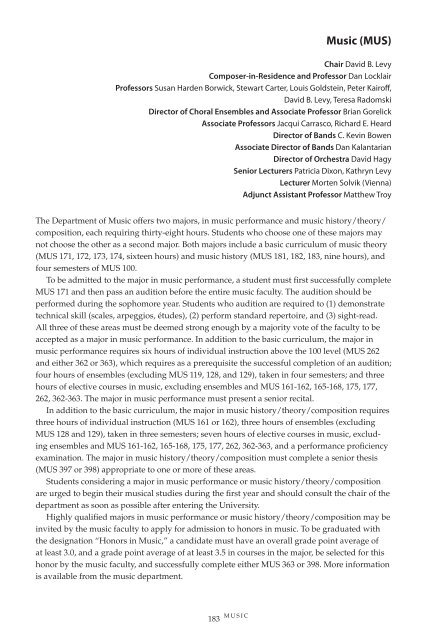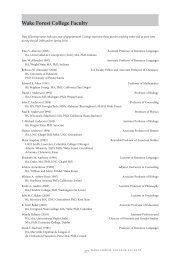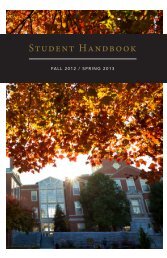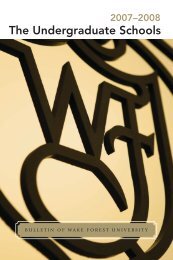theundergraduateschoo ls - Wake Forest University
theundergraduateschoo ls - Wake Forest University
theundergraduateschoo ls - Wake Forest University
You also want an ePaper? Increase the reach of your titles
YUMPU automatically turns print PDFs into web optimized ePapers that Google loves.
M U S I C<br />
183<br />
Music (MUS)<br />
Chair David B. Levy<br />
Composer-in-Residence and Professor Dan Locklair<br />
Professors Susan Harden Borwick, Stewart Carter, Louis Goldstein, Peter Kairoff,<br />
David B. Levy, Teresa Radomski<br />
Director of Choral Ensembles and Associate Professor Brian Gorelick<br />
Associate Professors Jacqui Carrasco, Richard E. Heard<br />
Director of Bands C. Kevin Bowen<br />
Associate Director of Bands Dan Kalantarian<br />
Director of Orchestra David Hagy<br />
Senior Lecturers Patricia Dixon, Kathryn Levy<br />
Lecturer Morten Solvik (Vienna)<br />
Adjunct Assistant Professor Matthew Troy<br />
The Department of Music offers two majors, in music performance and music history/theory/<br />
composition, each requiring thirty-eight hours. Students who choose one of these majors may<br />
not choose the other as a second major. Both majors include a basic curriculum of music theory<br />
(MUS 171, 172, 173, 174, sixteen hours) and music history (MUS 181, 182, 183, nine hours), and<br />
four semesters of MUS 100.<br />
To be admitted to the major in music performance, a student must first successfully complete<br />
MUS 171 and then pass an audition before the entire music faculty. The audition should be<br />
performed during the sophomore year. Students who audition are required to (1) demonstrate<br />
technical skill (scales, arpeggios, études), (2) perform standard repertoire, and (3) sight-read.<br />
All three of these areas must be deemed strong enough by a majority vote of the faculty to be<br />
accepted as a major in music performance. In addition to the basic curriculum, the major in<br />
music performance requires six hours of individual instruction above the 100 level (MUS 262<br />
and either 362 or 363), which requires as a prerequisite the successful completion of an audition;<br />
four hours of ensembles (excluding MUS 119, 128, and 129), taken in four semesters; and three<br />
hours of elective courses in music, excluding ensembles and MUS 161-162, 165-168, 175, 177,<br />
262, 362-363. The major in music performance must present a senior recital.<br />
In addition to the basic curriculum, the major in music history/theory/composition requires<br />
three hours of individual instruction (MUS 161 or 162), three hours of ensembles (excluding<br />
MUS 128 and 129), taken in three semesters; seven hours of elective courses in music, excluding<br />
ensembles and MUS 161-162, 165-168, 175, 177, 262, 362-363, and a performance proficiency<br />
examination. The major in music history/theory/composition must complete a senior thesis<br />
(MUS 397 or 398) appropriate to one or more of these areas.<br />
Students considering a major in music performance or music history/theory/composition<br />
are urged to begin their musical studies during the first year and should consult the chair of the<br />
department as soon as possible after entering the <strong>University</strong>.<br />
Highly qualified majors in music performance or music history/theory/composition may be<br />
invited by the music faculty to apply for admission to honors in music. To be graduated with<br />
the designation “Honors in Music,” a candidate must have an overall grade point average of<br />
at least 3.0, and a grade point average of at least 3.5 in courses in the major, be selected for this<br />
honor by the music faculty, and successfully complete either MUS 363 or 398. More information<br />
is available from the music department.






